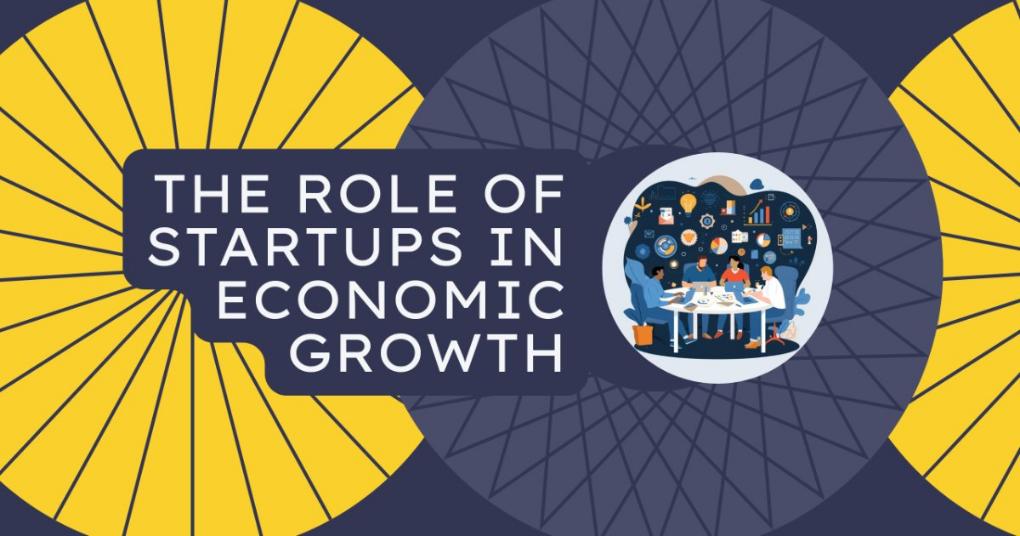The Role of Startups in Economic Growth
Discover how startups drive economic growth through innovation, job creation, and global competitiveness. Learn about 2025 trends, facts, and the future role of startups in shaping the economy.
In every corner of the world, from Silicon Valley to Karachi, startups have become powerful engines of economic transformation. While multinational corporations dominate headlines, it is often the small, agile, and innovative startups that reshape industries, disrupt traditional models, and open new opportunities. By 2025, the role of startups in driving economic growth has never been more significant. According to the Global Entrepreneurship Monitor, startups contribute nearly $6 trillion annually to the global economy. In countries like the United States, India, and China, they are central to job creation, technological advancement, and global competitiveness. This blog will explore the role of startups in economic growth, comparing them to traditional businesses, examining authentic data, and highlighting success stories from across the globe.
What Defines a Startup?
A startup is more than just a new business. It is a company designed to grow rapidly, often through innovation, technology, and scalable business models. Unlike traditional small businesses, startups typically:
Focus on innovation (products, processes, or services).
Rely on venture capital and angel investors.
Operate in uncertain, high-risk markets.
Aim for rapid growth and scalability.
Startups may begin small, but their potential for disruption and impact is immense.
Comparative Analysis: Startups vs. Traditional Businesses
Factor Traditional Business Startup
Objective Stability & steady growth Innovation & rapid scaling
Funding Bank loans, personal savings Venture capital, angel investors
Risk Level Moderate, predictable High, but with potential high reward
Job Creation Limited to local High potential, global reach
Economic Impact Contributes to GDP steadily Drives innovation, disrupts industries, fuels GDP growth
Key takeaway: While traditional businesses provide stability, startups fuel innovation and exponential growth.
The Global Economic Contribution of Startups
1. Job Creation
According to the Kauffman Foundation, nearly 3 million jobs are created annually by startups in the U.S. alone. Startups represent nearly 50% of new job creation worldwide.
2. GDP Contribution.
Startups contribute 4–6% of GDP growth in major economies like the U.S. and India. In emerging economies, startups are often the primary drivers of digital GDP.
3. Innovation Ecosystem
Startups lead in AI, fintech, biotech, and green energy, bringing new technologies to market faster than large corporations. Example: OpenAI, once a startup, now drives global AI innovation.
4. Attracting Foreign Investment
In 2024, global venture capital investment reached $345 billion, with much of it directed toward startups. India alone saw $25 billion in startup funding, strengthening its position as the world’s third-largest startup ecosystem.
Case Studies: Startups Driving Economic Growth
🚀 Case Study 1: India’s Startup Boom. India is home to over 110 unicorns (startups valued over $1 billion). Startups like Flipkart, Paytm, and Byju’s have transformed e-commerce, fintech, and education. The Indian government’s Startup India initiative boosted funding, mentorship, and tax benefits, fueling rapid economic growth.
💡 Case Study 2: Silicon Valley
Silicon Valley startups like Google, Facebook, and Airbnb began small but now contribute hundreds of billions of dollars to the U.S. GDP annually. Today, the region’s startup ecosystem employs millions and accounts for 15% of U.S. venture capital investment.
🌍 Case Study 3: Africa’s Digital Leap
African startups in fintech, such as Flutterwave and Paystack, are revolutionizing payments. With 70% of the African population underbanked, these startups are not only solving local challenges but also fueling Africa’s projected $180 billion digital economy by 2025.
Why Startups Matter for Economic Growth
1. Innovation and Disruption. Startups create new products and services that disrupt established industries. For example: Uber disrupted traditional taxi services. Revolut is transforming banking. Beyond Meat is challenging the food industry with plant-based alternatives.
2. Boosting Competitiveness
Startups push traditional businesses to innovate, improving overall market efficiency.
3. Fostering Entrepreneurship
Successful startups inspire others, creating a cycle of entrepreneurship that strengthens the economy.
4. Regional Development
Startups often emerge in developing regions, reducing economic inequality. For example, Pakistani startups like Airlift and Bazaar are modernizing transport and supply chains.
Challenges Startups Face in Driving Economic Growth
Despite their potential, startups face major hurdles:
1. Access to Funding – 90% of startups fail due to cash flow problems.
2. High Failure Rate – Globally, nearly 70% of startups fail within 5 years.
3. Regulatory Barriers – Complex tax policies and compliance requirements hinder growth.
4. Talent Acquisition – Startups struggle to compete with corporations for skilled workers.
Government and Policy Support
Governments play a key role in enabling startups to contribute to economic growth. India: Tax breaks and simplified regulations under the Startup India program. United States: The Small Business Administration (SBA) provides funding and training. Europe: The EU’s Horizon Europe program allocates €95.5 billion for innovation and research-driven startups. Pakistan: The State Bank of Pakistan introduced regulatory sandboxes for fintech startups, enabling safe innovation.
Startups and the Future of the Global Economy
Looking ahead, startups are set to dominate critical sectors: Artificial Intelligence & Automation AI startups like Anthropic and Stability AI are redefining industries. Green Energy Renewable startups are expected to attract over $2 trillion in investment by 2030. Healthcare & Biotech – Startups focusing on genetic research, telemedicine, and biotech will address global health challenges. Fintech & Digital Payments – By 2030, 75% of all transactions will be digital, driven largely by fintech startups. Startups will not only create wealth but also tackle pressing global issues like climate change, unemployment, and inequality.
Conclusion
Startups are far more than small businesses. They are the backbone of innovation, job creation, and global economic competitiveness. From Silicon Valley giants to emerging market disruptors, startups are proving that they can reshape economies at lightning speed. Yes, challenges exist—funding shortages, failure risks, and regulatory hurdles—but with the right ecosystem of investors, governments, and entrepreneurs, startups can continue to drive exponential economic growth.In 2025 and beyond, economies that nurture startups will lead the world in innovation, inclusivity, and prosperity.
